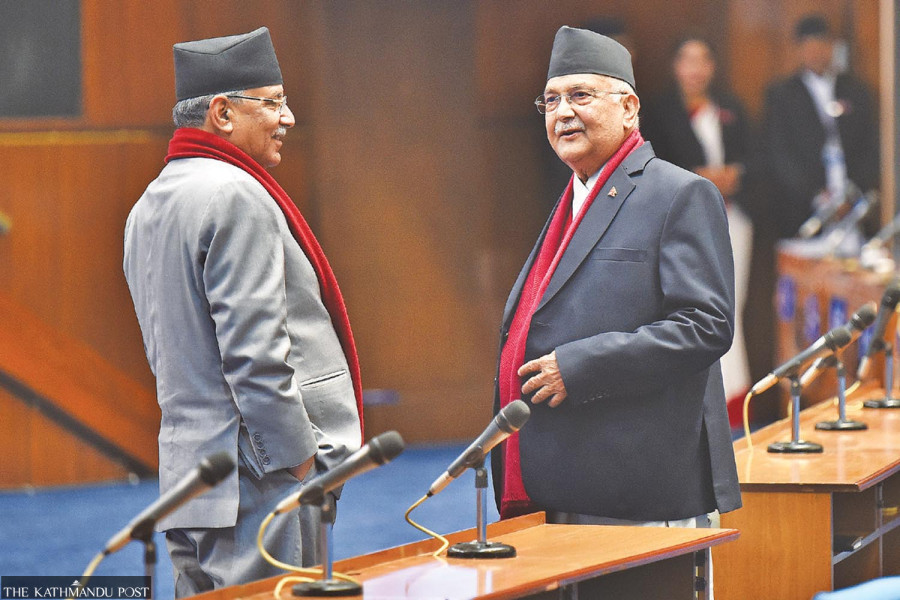National
Congress on ‘Mission President’ after its futile Speaker bid
The largest party is trying to take advantage of the discontent in the ruling coalition and perceived mistrust between Prime Minister Dahal and CPN-UML chair Oli.
Tika R Pradhan
The leaders of Nepali Congress, the largest party in the House of Representatives, did not take kindly to their then-ally Pushpa Kamal Dahal, chair of the CPN (Maoist Centre), joining hands with the CPN-UML to become prime minister on December 25.
Since then, the party has been trying to divide the new UML-led seven-party alliance that elected Dahal the prime minister and also formed governments in all seven provinces.
With its eyes on top state posts—President and Speaker—Congress has tried to cosy up to Dahal again in order to create a rift in the ruling coalition. The largest party gave a vote of trust to the prime minister on January 10. In return, Dahal said he would try his best to accommodate Congress’ concerns in the elections for the top posts.
Congress’ attempt yielded no result in the Speaker election after UML’s Ghimire won the coveted post on Thursday. But Congress leaders have said they are now focused on presidential elections in what they label ‘Mission President’.
Though the UML candidate’s election as Speaker was a foregone conclusion, Congress had formed a separate alliance to counter the UML-led coalition and fielded its own candidate for House leader.
Besides the Congress, the Madhav Nepal-led CPN (Unified Socialist) with 10 seats, the Loktantrik Samajbadi Party with four seats, and the Rastriya Janamorcha, which has one seat, stood against the candidate of the ruling alliance in the Speaker vote. Though Congress could not lure away any of the parties supporting the government into its fold, it continues to try to reach out to the parties in the ruling alliance.
The Janata Samajbadi Party and the Nagarik Unmukti Party that are in the ruling coalition haven’t joined the government over their discontent in power-sharing. Though the Janamat Party has nominated a minister, the party’s chief CK Raut has publicly expressed his dissatisfaction over ministerial allocation. Raut hasn’t accepted the ministerial portfolios offered to his party.
Such discontent in the ruling coalition has given the Congress room to play.
On Thursday, the differences between the prime minister and the UML chair Oli over the election of the new President were revealed with Prime Minister Dahal saying he would continue his bid to develop national consensus on a presidential candidate while Oli reiterated that UML’s candidate should be elected to the post.
“In the time we have for the President’s election, our efforts will be aimed at forging an agreement among the parties [on the President],” Dahal told reporters following the election of the Speaker on Thursday.
But the UML, the largest party in the ruling coalition, is dead set against the idea of national consensus on the candidate for the President.
“There should be a national consensus on our candidate [for President],” Oli said while responding to queries of reporters after the House elected his close aide Dev Raj Ghimire its Speaker.
Congress leaders have openly said their mission is to break the existing ruling alliance and the move is on to snatch away the post of President from the CPN-UML. Prime Minister Dahal also appears keen to somehow neutralise the domineering UML chair KP Sharma Oli.
According to Maoist leaders, just weeks after becoming prime minister with UML’s backing, Dahal has already been alarmed by Oli’s activities. Oli’s proactive role in forming the high-level mechanism under his own leadership and some of the mechanism’s decisions have made Dahal wary. Oli’s cosying up with Rastriya Prajatantra Party’s Rajendra Lingden and Rastriya Swatantra Party’s Rabi Lamichhane has further alarmed the prime minister, said Maoist leaders close to Dahal.
Nepali Congress leader and lawmaker Chandra Bhandari said his party’s mission also remains incomplete.
“We had a four-party coalition but that fell through before it could form a government. We will continue our attempt to break the other ruling coalition,” Bhandari told reporters after the Speaker’s election on Thursday. “We failed in our ‘Mission Speaker’ and now we will focus on ‘Mission President’.”
To add fuel to the fire, Congress General Secretary Bishwa Prakash Sharma on Thursday accused Oli of trying to confine the prime minister in a cage. He was hinting at Oli’s attempts to control government functioning via the high-level political mechanism.
Oli countered Sharma that he was only following the precedent set by the Congress.
But some political analysts also believe Dahal may not accept Congress’ proposal easily after having been betrayed by Congress President Sher Bahadur Deuba over the prime minister’s post only recently.
“It will be a risky game for Dahal to betray Oli and vote for a Congress candidate for the President,” said Hari Roka, a political analyst. “As the Shekhar Koirala-Gagan Thapa faction in Congress cannot be fully relied upon, Dahal may not take that risk unless a unified Congress convinces him with a fool-proof plan.”
There is widespread dissatisfaction across the Maoist Centre’s ranks that alliance with Congress left the party in a much worse situation as the Shekhar Koirala-Gagan Thapa faction played the role of a ‘villain’ which, according to Congress insiders, was responsible for reducing the party’s legislative strength to half compared to 2017 polls.
Maoist Centre leaders said there is nothing definite they could say about the President with still a lot of time left for the presidential election.
“Yes, we wanted a consensus candidate for President in order to ensure stability but we cannot say what will happen in a few weeks’ time,” said Haribol Gajurel, a deputy general secretary of the Maoist Centre who is also a possible candidate for political adviser to the prime minister. “The UML could by then also discuss the presidential candidate with the Congress.”




 10.12°C Kathmandu
10.12°C Kathmandu















